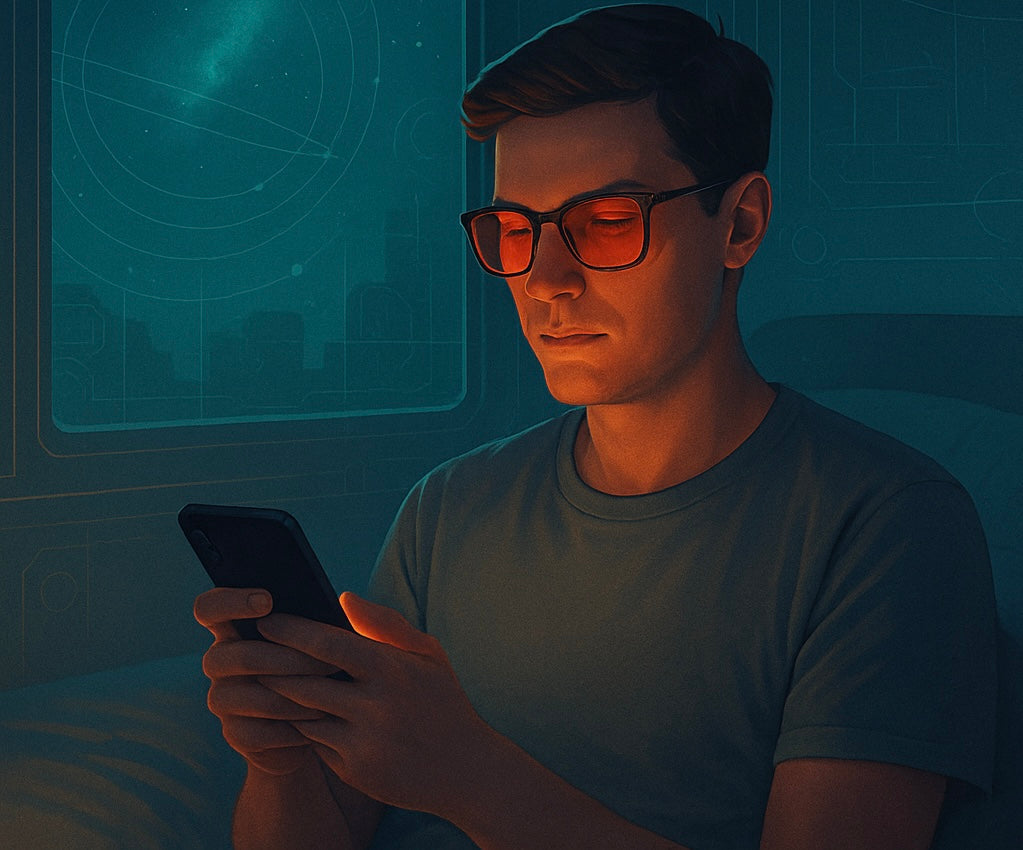
How Blue Light Hijacks Your Brain’s Sleep Signals (And How to Fix It)
Share
In today’s screen-filled world, getting a good night’s sleep feels harder than ever. You shut your laptop, scroll through your phone, and then lie in bed—wide awake. The culprit? Blue light.
But this isn’t just a buzzword. Blue light is hijacking your brain’s natural sleep signals. And if you’re not protecting yourself from it, your energy, focus, and health could be paying the price.
Let’s break it down—and show you exactly how to fix it.
🚨 The Science: Why Blue Light Disrupts Sleep
Your body runs on a 24-hour internal clock called the circadian rhythm. It controls when you feel awake and when you get sleepy, mostly regulated by a powerful hormone called melatonin—your body’s natural signal to fall asleep.
But here's the problem:
🔵 Blue light — the same light emitted from phones, tablets, laptops, and TVs — tricks your brain into thinking it’s still daytime.
It suppresses melatonin production, keeping your brain alert long after you should be winding down.
In fact, exposure to blue light at night can delay sleep by up to 3 hours, even if you're exhausted. Over time, this leads to poor-quality sleep, grogginess, and increased risk of anxiety, weight gain, and even cognitive decline.

🧪 The NASA Connection: What Astronauts Can Teach Us
Astronauts on the International Space Station face extreme circadian disruption—they orbit the Earth every 90 minutes and see 16 sunrises a day.
To help them sleep, NASA developed advanced lighting and lens technology to filter out high-frequency blue light, helping reset their internal clocks and restore melatonin production.
That same technology is now available to you.

👓 The Fix: Block Blue Light Before Bed
You don’t need to ditch your devices—you just need to defend yourself.
Here’s how:
✅ 1. Use 99% Blue Light Blocking Glasses
Wearing glasses with orange-tinted lenses that block the blue spectrum (especially around 455nm) has been shown to boost melatonin levels, reduce eye strain, and improve sleep latency.
Maurice Health’s NASA-inspired lenses block 99% of harmful blue light — exactly the range that suppresses melatonin the most.
✅ 2. Set a “Digital Sunset”
Stop using screens 60–90 minutes before bed—or wear your blue light blockers if you must scroll.
✅ 3. Switch to Night Mode
Enable blue light filters on all your devices. Apps like f.lux or Night Shift reduce the blue hue, but they’re only about 40–60% effective.
✅ 4. Dim the Lights
Use warm, amber lights in your room at night. Avoid LED overhead lights which are blue-heavy.

🧠 Bonus: What Happens When You Protect Your Sleep
Users who block blue light before bed report:
-
Falling asleep faster
-
Deeper, uninterrupted sleep
-
Sharper focus and energy the next day
-
Reduced screen-induced headaches and eye strain

🔬 Sleep Isn’t a Luxury — It’s a Superpower
If you're serious about your performance, mental clarity, or just feeling human again — blue light protection is non-negotiable.
Don’t let your phone hijack your sleep.
👓 Explore Maurice Health’s NASA-Inspired Blue Light Blocking Glasses → [Shop Now]

